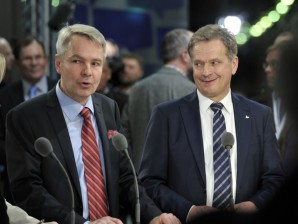HELSINKI — The conservative front-runner and a gay Greens candidate launched last-minute efforts to woo voters Saturday on an upbeat note, after two weeks of campaigning in Finland’s presidential runoff.

PROUDLY GREEN AND GAY Green Party presidential candidate Pekka Haavisto, left, and National Coalition candidate Sauli Niinisto await the results of the advance votes at an election night rally in Helsinki, Finland Sunday Jan. 22, 2012. Polls closed in Finland's presidential election Sunday with advance ballots giving the conservative pro-Europe favorite a clear lead, but without the majority needed to avoid a runoff. AP PHOTO/LEHTIKUVA, PEKKA SAKKI
Ex-finance minister Sauli Niinisto, 63, who leads polls by a wide margin, said he felt invigorated by a large turnout of potential voters before Sundays election, a sentiment echoed by his 53-year-old opponent, former environment minister, Pekka Haavisto.
“The mood is very good, even lively,” Niinisto told reporters at a shopping mall on the outskirts of the capital, Helsinki. “I’m very satisfied … that the campaign has continued on such a good note. It inspires enthusiasm.”
Haavisto, Finland’s first openly gay presidential candidate from the small Greens party faces a hard task in beating Niinisto, a veteran conservative, popular among older voters.
Many voters will find it difficult to cast a ballot for the environmentalist who lives with a male Ecuadorean immigrant, says Pertti Timonen, political researcher at Tampere University.
“Haavisto has certain handicaps like his sexual orientation, his (gay) partnership, being Green … In the end, they will most likely pose too great an obstacle for him to be chosen president,” Timonen said.
Haavisto’s sexual orientation hasn’t come up in newspaper editorials or been a major issue in election debates between him and his rival Sauli Niinisto, but remains below the surface in the Nordic country where family affairs are considered private.
“I have the impression that Finns are tolerant and feel that everyone is entitled to their privacy and that the private lives of others are none of their business,” Haavisto, 53, told The Associated Press, but conceded that his sexual orientation could be “a hurdle” for some voters.
“We need a president to represent the country, to be a figurehead,” said Timo Tahti, a 50-year-old fire chief. “Finland is not ready for anything radical so the more conservative of the two candidates, Niinisto, will clearly win. They (voters) don’t want a man who is Green and gay.”
Haavisto draws support from a core of young, liberal, urban voters. He got 19 percent of the vote to finish second in a field of eight candidates in the first round on Jan. 22. Niinisto, who won with 37 percent, has maintained a clear lead in surveys leading up to the second round.
A poll published by national broadcaster YLE on Thursday gave Niinisto 62 percent support against 38 percent for Haavisto. Taloustutkimus interviewed 1,492 people in Jan. 25 to Feb. 1 for the survey, which had a margin of error of 2.5 percentage points.
The candidates have a lot in common. They entered politics in 1987, when they were voted into Parliament. They come from affluent backgrounds, share a gentlemanly manner and in true Finnish fashion, have not been provoked into confrontation during debates.
Both also have international credentials and are staunchly pro-European, buffering a backlash against immigration and European integration that boosted the populist True Finns party in last year’s parliamentary elections.
But whereas Niinisto is a hard-baked economist who was finance minister when Finland adopted the euro in 2002, the soft-spoken Haavisto is a trailblazer of Finland’s environmental movement. He became Europe’s first government minister from a Green party when he was given the environment portfolio in 1995.
The Finnish president has a largely ceremonial role with fewer powers now than in previous decades, and is not directly involved in daily politics. However, the president takes the lead on non-EU matters of foreign policy and can play a role as a “brand ambassador” of Finland overseas.
Sunday’s winner will replace outgoing Tarja Halonen, one of Finland’s most popular heads of state, who won re-election to a second six-year term in 2006.